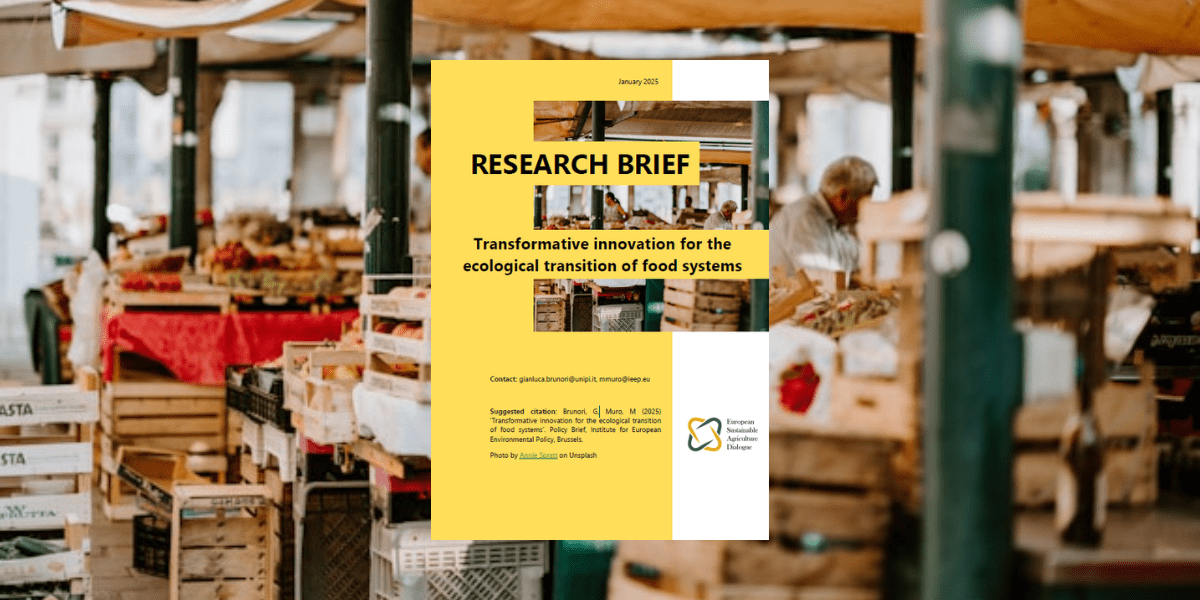AUTHORS: Gianluca Brunori (Università di Pisa) and Melanie Muro (IEEP)
Innovation plays a critical role in advancing the ecological transition of food systems in the face of ongoing crises such as climate change, geopolitical instability, and social unrest. This policy briefing highlights the importance of transformative innovation – systemic changes that challenge existing structures and practices while fostering sustainability, equity, and resilience. The document also outlines the guiding principles for a research agenda focused on driving transformative innovation.
The recently published report of the Strategic Dialogue on the Future of EU Agriculture clearly states “Innovation, technology and knowledge play a key role in the transition of the agri-food sector” (p.13), identifying the need to leverage technology and innovations as one of its ten guiding political principles. The report emphasises the need for technical and social innovations that are inclusive, accessible, and co-developed with end users to ensure relevance to specific contexts.
Past food system transformations were largely propelled by technological and economic drivers within rapidly changing societies. For instance, the ‘supermarket and food service revolution’ has dramatically reshaped consumer behaviour, while the ‘nutrition transition’ has shifted traditional diets rich in cereals and fibres toward those dominated by sugars, fats, and animal-source foods. Public policies at the time prioritised growth, productivity, and abundance, aligning private and public goals without significant tension.
This policy brief argues that food should be treated as a common good, not merely a commodity. Achieving a sustainable transition in food systems requires more than the continued reliance on private and technological drivers. It demands clear directionality—explicit goals, rules, and incentives that prioritise the public good and address pressing societal challenges. Transformations of this scale rely on active participation from civil society and public administrations to foster behavioural and organisational change. Consequently, the research and innovation underpinning this shift must also change.
A research agenda for transformative innovation should be guided by the following principles:
- Adopt a systemic approach: Break down sectorial and disciplinary siloes, seeking synergies between sectors and fields to achieve common goals. Identify the systemic causes of societal problems and activate mechanisms to address them.
- Link long-term with short-term goals: Implement short-term solutions that activate systemic mechanisms contributing to long-term objectives. Explore synergies and trade-offs between short-term actions and long-term perspectives. Use foresight studies to develop future scenarios and visions.
- Build a narrative for transformative innovation: Develop credible and motivating theories of change that can inspire researchers, enterprises, civil society, and public servants.
- Integrate multidimensional solutions: Combine nature-based, technology-based, socially-based, and institution-based solutions to address complex problems. This approach generates synergies between ecological, technological, social, and institutional innovations.
- Develop context-specific solutions: Transformative innovation encourages research to consider the diversity of contexts and develop a tailored solution
- Engage stakeholders in research: Involve stakeholders in the research process to add legitimacy and relevance to scientific methods and institutions. Include representatives of diverse values and interests, and foster collaboration and communication among various stakeholders.
Cover image by Annie Spratt on Unsplash

